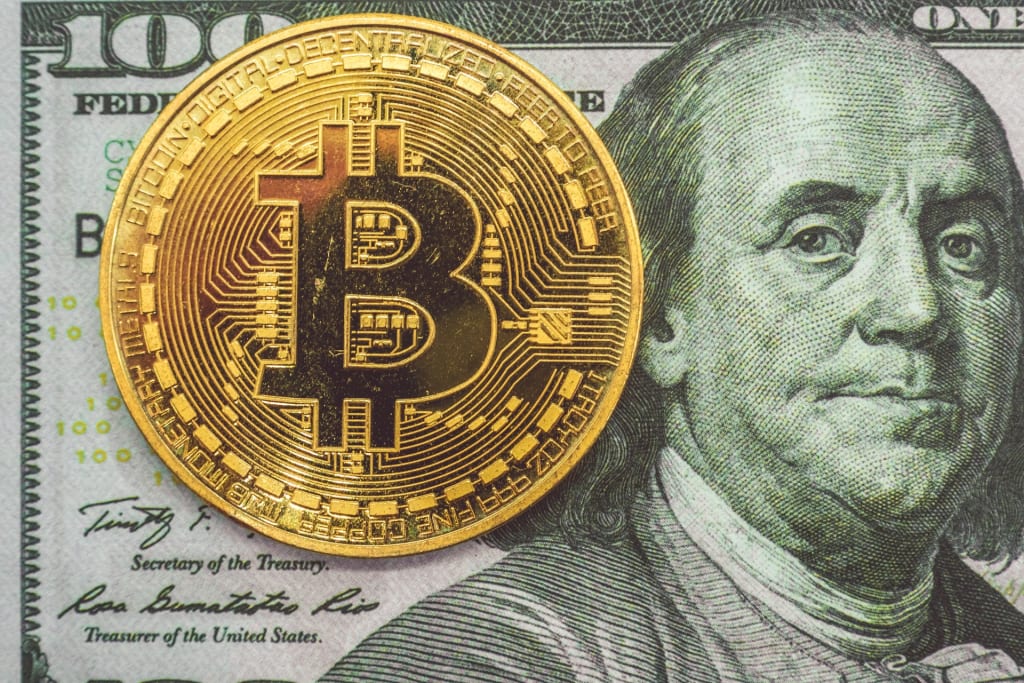Bitcoin Reached an All-time High ($67,599)
Cryptocurrencies and why they are so popular.


I was utterly wrong about cryptocurrencies. What I initially thought was a lot of rubbish turned out to be a whole new world of possibilities. It’s not hard to see why this market is so popular and grows with each passing day.
As you probably know by now, Bitcoin achieved an all-time high (ATH) on Oct 20th, 2021, and at some point, it touched the $67,599 mark. Currently, cryptocurrencies are what everybody is talking about. People want to get on board with something that allows them more freedom and opportunities than ever before. It’s not hard to see why cryptocurrencies like Bitcoin are so popular. All you need is an internet connection (or some smartphone) and money in your bank account or debit card; for starters, it doesn’t require a brick-and-mortar store either! You can buy cryptocurrencies from home without needing much physical space around you at all. Then there’s also cryptocurrency mining which requires no manual labor but gives out monetary rewards when done successfully, such as Bitcoins or other cryptos that pay dividends in the form of long-term gains delivered daily/weekly/monthly, etc. This makes cryptocurrencies even more popular because cryptocurrencies can be bought and traded in fractions. So you don’t need to invest the whole amount of money at once as you would with stocks, for example.
Cryptocurrencies are also easy to send from one person or entity to another without any third parties involved. This means no banks, credit card companies, or other financial institutions usually charge hefty fees when sending your hard-earned cash across borders. Many people realize how cryptocurrencies give them more freedom than ever before while still being profitable due to their volatility compared with fiat currencies such as the Dollar and the Euro.
When I first learned about cryptocurrencies, it completely blew my mind. The concept of cryptocurrencies was so fascinating that I devoured every bit of information on the topic. I realized how much more cryptocurrencies are than just digital coins with no value or tangible form. They can be used in physical money and even traditional banking systems because they offer a whole new set of possibilities that were not available before cryptocurrencies came along.
What makes cryptocurrencies unique?
Their decentralized nature combined with blockchain technology allows for many other applications beyond payment methods like intelligent contracts. I missed the train when I first heard of crypto. It wasn’t until the beginning of this year that I made my first investments in this market. This was when I realized how much cryptocurrencies are more than just coins or money that you can hold on your bank account, which appreciate with time simply because there are people who buy them and then sell them at higher prices, later on, making some good profits.
When it comes to cryptocurrencies like Bitcoin specifically, they have value because of their scarcity built into their code. By investing in these, you support blockchain technology development, meaning that eventually, cryptocurrencies could be used everywhere instead of traditional paper currencies or digital fiat monies held online.
Today, an investor must research where cryptocurrencies come from, so we know what makes them valuable and what they can do for us as investors. This is important because there are many scams out there. Not all coins/tokens are created equal.
Cryptocurrencies are digital coins that you can send, store or use electronically, making them convenient for online transactions, etc.
The price of cryptocurrencies fluctuates quite a bit over time, so if you invest in Bitcoin today, chances are tomorrow its value will change drastically.
Bitcoin is a type of cryptocurrency, and, like other cryptocurrencies, it can be traded and exchanged for goods and services. Bitcoin uses a distributed ledger or blockchain technology to facilitate decentralization in how currency transactions are verified. In this way, Bitcoin allows for transactions to be processed without the need for a centralized banking authority or third-party transaction verification. This innovative type of currency relies on cryptographic software to process transactions. Each coin is represented by an encrypted digital signature, which is only accessible by the bitcoin owner.

Bitcoin as a Store of Value and a Medium of Exchange
Bitcoin is a cryptocurrency and a digital payment system created in 2009. Unlike fiat, Bitcoin is the first decentralized cryptocurrency that emerged in the market and was developed by an unknown person or group of people using the name of “Satoshi Nakamoto.” Bitcoin is open-source; its design is public, nobody owns or controls Bitcoin, and everyone can participate. Bitcoin transactions are secured by military-grade cryptography. When created, they decided on a limited supply of just 21 million bitcoins that could ever exist.
Bitcoin can be a store of value because it has the following qualities necessary to store value: scarcity, durability, divisibility, portability, and acceptability.
The invention of Bitcoin was a significant breakthrough in the evolution of money. It is a form of digital currency with no physical form and is not tied to any banks or central authority. Bitcoin has been the subject of a great deal of speculation and interest since its inception in 2009. But it has yet to grow into a mainstream medium for exchange.
Bitcoin uses peer-to-peer technology to operate with no central authority or banks; managing transactions and issuing bitcoins is carried out collectively by the network.
Bitcoin is a form of digital currency that allows for quick, secure, and anonymous transactions. Bitcoins are not tied to any particular country or central bank, which means they can be transferred across borders easily without exchanging currencies. In comparison, Ethereum offers more flexibility through intelligent contracts embedded within its blockchain protocol.
Bitcoin is a cryptocurrency and worldwide payment system. It is the first decentralized digital currency, as the system works without a central bank or single administrator. Through cryptography, transactions are verified by network nodes and recorded in an immutable public distributed ledger called blockchain (what cryptocurrencies are).
Bitcoin is an open-source software project, which means many people are working on it. There has been controversy around cryptocurrencies that have led to the loss of millions in dollars and brought into question cryptocurrencies’ legitimacy and potential for future viability. However, Bitcoin was created to be a medium of exchange like regular money (USD), except without any centralized authority or banks involved in its transactions. It runs autonomously with no central bank controlling how much bitcoin exists currently or what determines its value; instead, bitcoins derive their inherent worth through scarcity and demand within global market exchanges.
Blockchain technology refers to the core innovation behind cryptocurrencies like Bitcoin. Blockchain works kind of like Google Docs, where anyone can edit them at any time as long as they have the proper permissions. This is why cryptocurrencies are often referred to as “decentralized,” meaning that there is no central authority (like a bank) overseeing them, and their value isn’t tied up in one place but instead across many places at once; this means transactions can be verified without the need for third-party verifiers like banks or other financial institutions.

Bitcoin’s blockchain ledger would record all bitcoin exchanges between parties, even if it were just one computer talking to another on Bitcoin’s peer-to-peer network over port 8080 using JSON messages encoded in hexadecimal notation. Anyone with an internet connection can create a wallet and receive giving themselves thousands of dollars worth of bitcoins by generating their address through mining (creating cryptocurrencies) and then opening the bitcoin wallet to make transactions with others.
The most important thing you need to know about cryptocurrencies is they are not tangible items like gold, silver, or cash; instead, bitcoins derive their inherent worth through scarcity and demand within global market exchanges (or lack thereof). A few years ago, cryptocurrencies were mainly unregulated. Still, over time there has been more government oversight into how cryptocurrencies operate, including new rules for exchange platforms. That has made it harder for people in certain countries who use Bitcoin as a medium of exchange. The future of cryptocurrencies will likely include more regulations on these decentralized peer-to-peer networks where everyone can be involved without asking permission first from any financial institutions — which some governments may never fully accept.
DISCLAIMER: I am not a financial advisor. This post is for entertainment and educational purposes only. I am not recommending financial products, always do your research and make your own decisions about what is best for you.
About the Creator
Alejandro Betancourt
I am a single father, an entrepreneur & a businessman. I founded a couple of venture capital funds. I write about business, tech, finance & the human spirit.






Comments
There are no comments for this story
Be the first to respond and start the conversation.